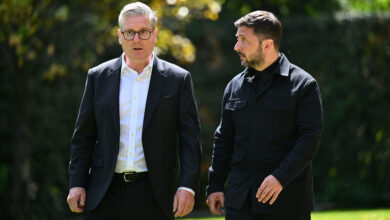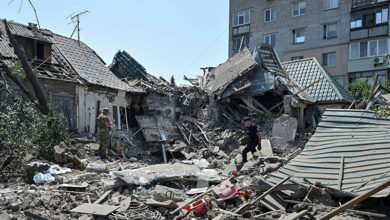Pakistan has called for “intervention” from global powers in resolving key issues with India amid ongoing tensions, members of a high-level delegation presenting Islamabad’s stance said on Sunday after landing in London.
Earlier this month, Pakistan launched a broad-based engagement campaign to present its perspective on the recent conflict with India to the world and counter New Delhi’s unproven allegations. As part of its global outreach, the team has visited the United States, is currently in London, and will also head to Brussels.
The delegation comprises former foreign ministers Bilawal Bhutto-Zardari, Hina Rabbani Khar and Khurram Dastgir; Senators Sherry Rehman, Musadik Malik, Faisal Subzwari and Bushra Anjum Butt; along with senior envoys Jalil Abbas Jilani and Tehmina Janjua.
“We had the upper hand [during the conflict]. Despite that upper hand, we agreed to the ceasefire on the condition that there would be further dialogue in the future on all friction points at a neutral location,” Bilawal told reporters in London.
Asked whether he thought that the Kashmir dispute would soon be resolved after the US mediated the ceasefire, Bilawal expressed the hope that “moving forward, Trump or his government will keep its promise” as Pakistan’s defence position was better than India’s during the conflict.
“We hope that on an international level, whether it’s the United States or the United Kingdom, they all would play their role and convince India to resolve our issues through talks,” the MNA said.
The former foreign minister asserted that Pakistan had asserted its “strength” by taking down six Indian jets and now, peace needed to be established. He said those six jets were the “same as those that dropped their payload”, resulting in civilians’ deaths.
He further said that throughout the conflict, the country was seen as a “rational and responsible state”.
Meanwhile, the delegation led by Bilawal, which had arrived in London a day ago, also engaged with eminent members of a British think tank, academia, and policymaking community at Chatham House today.
During the closed-door discussion, the team conveyed Pakistan’s perspective on the recent escalation while “expressing serious concern about India’s unprovoked military aggression that resulted in civilian casualties and posed a significant threat to regional stability”, said a statement by the Pakistan High Commission in London.
It stressed that India’s actions constituted a clear violation of Pakistan’s sovereignty, international law and the United Nations Charter.
The delegation highlighted that the pending resolution of the Kashmir dispute remained the “principal stumbling block to lasting peace and stability in the region” and reiterated the call for global action to support meaningful dialogue and respect for international commitments.
Denouncing India’s move to unilaterally and illegally hold the Indus Waters Treaty (IWT) in abeyance, Bilawal warned that the “weaponisation of water undermines international norms and sets a perilous precedent”.
He urged the international community to take notice of the “alarming development and hold India to account for its actions”, according to the statement.
The delegation asserted that Pakistan’s response to India demonstrated the country’s resolve to defend its sovereignty and thwart “India’s ambitions to set any new so-called ‘normal’ in the region”.
Besides the delegation, Pakistan’s High Commissioner to the UK, Dr Mohammad Faisal, was also present during the round table conference.
The delegation also met with UK’s Middle East minister Hamish Falconer and his team at the Foreign, Commonwealth & Development Office (FCDO), Faisal said on X.
Bilawal also attended a discussion with members of the International Institute for Strategic Studies, attended by its associate fellow for South and Central Asia, Desmond Bowen, according to a post by Faisal.
In the UK, the team is set to hold meetings with the senior leadership of the UK Parliament, including the All Parties Parliamentary Groups on Pakistan and Kashmir, a press release had stated.
Diplomatic contest
On June 4, the Bilawal-led delegation concluded its two-day visit to New York, where it met with United Nations Secretary-General Antonio Guterres, along with elected and permanent members of the UN Security Council.
It then met with several US Congress members in Washington — including the chairman of the House Foreign Affairs Committee — as well as think tanks.
Another delegation, led by Special Assistant to the Prime Minister Syed Tariq Fatemi, visited Moscow from June 2 to June 4. It met with Russia’s Foreign Minister Sergey Lavrov and a senior aide to President Vladimir Putin.
On its part, India had also announced that seven all-party delegations would visit key partner countries, as well as meet members of the UNSC, to present the country’s stance on terrorism and “project India’s national consensus”.
On June 5, the Indian delegation met US Vice President JD Vance, taking advantage of his links to India.
Both delegations lobbied for their countries on Capitol Hill, meeting senior US lawmakers and chairs of various Congress committees.
The Indian delegation met members of the Senate Foreign Relations and Intelligence Committees, including senators Dave McCormick, Jacky Rosen, Jim Risch, Mark Warner, John Cornyn, and Elissa Slotkin.
The Indian delegation is led by Congress MP Shashi Tharoor and includes Shambhavi Chaudhary (Lok Janshakti Party), Sarfaraz Ahmed (Jharkhand Mukti Morcha), G.M. Harish Balayogi (Telugu Desam Party), Shashank Mani Tripathi, Tejaswi Surya, and Bhubaneswar Kalita (all from the BJP), Mallikarjun Devda (Shiv Sena), former Indian ambassador to the US Taranjit Singh Sandhu, and Shiv Sena MP Milind Deora.






